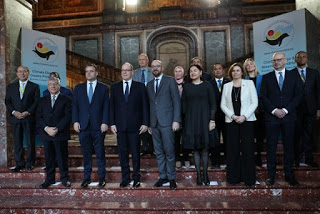Shark DNA Holds Cancer Curing Secrets, Morocco Signs Brussels Ocean Declaration, Oregon Salmon Plan Backfires, Climate Change Pioneer Dies and more…
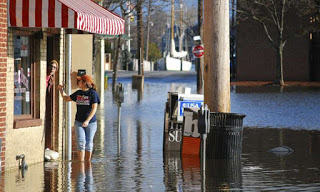 Impacts from climate change are not always easy to see. But for many local businesses in coastal communities across the United States, the evidence is right outside their doors. That evidence isn’t just present in the form of more frequent flooding. According to a new study published Feb. 15 in the Journal Science Advances, it is also revealed an official cost of doing business. Stanford graduate student Miyuki Hino and her colleagues found that downtown Annapolis, Maryland suffered a loss of 3,000 visits in 2017 due to high-tide flooding, which equates to a loss of somewhere between $86,000 and $172,000 in revenue. Small businesses in downtown Annapolis rely on visitors. By measuring the economic extent of the impact of flooding, we can understand how sea level rise is already impacting businesses’ experiences and profits,” said Samanthe Belanger, a co-author and Stanford MBA student at the time of the study.
Impacts from climate change are not always easy to see. But for many local businesses in coastal communities across the United States, the evidence is right outside their doors. That evidence isn’t just present in the form of more frequent flooding. According to a new study published Feb. 15 in the Journal Science Advances, it is also revealed an official cost of doing business. Stanford graduate student Miyuki Hino and her colleagues found that downtown Annapolis, Maryland suffered a loss of 3,000 visits in 2017 due to high-tide flooding, which equates to a loss of somewhere between $86,000 and $172,000 in revenue. Small businesses in downtown Annapolis rely on visitors. By measuring the economic extent of the impact of flooding, we can understand how sea level rise is already impacting businesses’ experiences and profits,” said Samanthe Belanger, a co-author and Stanford MBA student at the time of the study.
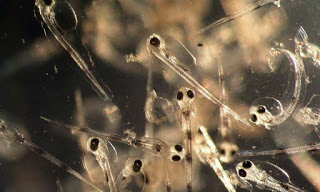
Along with rising temperatures and dwindling oxygen concentrations, acidification is a major threat to marine life. These are all by-products of global climate change. Carbon dioxide concentrations in the atmosphere are rising and the ocean, compensates by absorbing increasing amounts of CO2 from the atmosphere. The reaction of carbon dioxide with the water forms carbonic acid, the pH is lowered—the ocean becomes more acidic. One species that is adversely affected is the Atlantic cod. A new scientific study, just published in Global Change Biology by scientists from the GEOMAR Helmholtz Centre for Ocean Research Kiel with colleagues from France and Norway, concurs with previously published studies showing that high carbon dioxide concentrations is detrimental to this species.
4. Shark DNA Could Help Cure Cancer and Age-Related Illnesses in Humans
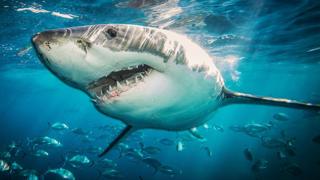 Great white sharks may hold the secrets to curing cancer and other age-related diseases, experts believe. The first map of great whites sharks’ DNA has revealed “mutations” that protect the animals against cancer and other illnesses. Scientists hope more research could help apply the findings to treating age-related illnesses in humans. The great white’s ability to repair its own DNA has evolved in ways ours has not. The research was carried out by a team of scientists at the Save Our Seas Foundation Shark Research Centre at Nova Southeastern University in Florida.
Great white sharks may hold the secrets to curing cancer and other age-related diseases, experts believe. The first map of great whites sharks’ DNA has revealed “mutations” that protect the animals against cancer and other illnesses. Scientists hope more research could help apply the findings to treating age-related illnesses in humans. The great white’s ability to repair its own DNA has evolved in ways ours has not. The research was carried out by a team of scientists at the Save Our Seas Foundation Shark Research Centre at Nova Southeastern University in Florida.
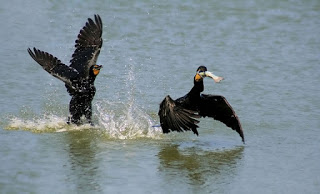 The federal government killed thousands of double-crested cormorants in Oregon between 2015 and 2017 and may have caused the collapse of the birds’ largest breeding colony in a bungled effort to help young salmon make it to the ocean alive. Meanwhile, state biologists say the birds just moved upriver – where now each eat three times as much salmon because they are forced to hunt younger and smaller fish.
The federal government killed thousands of double-crested cormorants in Oregon between 2015 and 2017 and may have caused the collapse of the birds’ largest breeding colony in a bungled effort to help young salmon make it to the ocean alive. Meanwhile, state biologists say the birds just moved upriver – where now each eat three times as much salmon because they are forced to hunt younger and smaller fish. Government agencies have been on the offense to protect salmon by killing their natural predators. Sea lions and Caspian terns have been recent targets, and gulls may soon be added to the list. But what happened with cormorants has raised doubts as to the wisdom of the plan. James Lawonn, Oregon Department of Fish and Wildlife biologist in charge of avian predation, says his agency “expects little to no gain in survival” for young salmon swimming through the Columbia River estuary with the federal management plan.
Editorial Note: We are doing the same thing now by authorizing the euthanasia of sea lions in Oregon for eating Salmon. What downstream effect might this have?
A pioneering scientist who raised early alarms about climate change and popularised the term “global warming” has died at age 87. Wallace Smith Broecker, a Columbia University professor, and researcher, died on Monday at a hospital in New York City, according to a spokesman for the university’s Lamont-Doherty Earth Observatory. Broecker brought “global warming” into common use with a 1975 article that correctly predicted rising carbon dioxide levels in the atmosphere would lead to pronounced warming.

